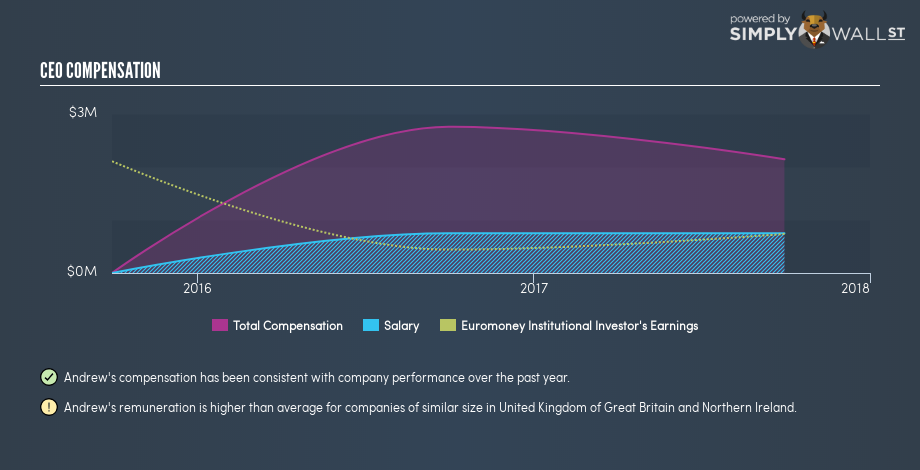Is Euromoney Institutional Investor PLC’s (LON:ERM) CEO Being Overpaid?

In 2015 Andrew Rashbass was appointed CEO of Euromoney Institutional Investor PLC (LON:ERM). This report will, first, examine the CEO compensation levels in comparison to CEO compensation at companies of similar size. After that, we will consider the growth in the business. And finally – as a second measure of performance – we will look at the returns shareholders have received over the last few years. The aim of all this is to consider the appropriateness of CEO pay levels.
See our latest analysis for Euromoney Institutional Investor
How Does Andrew Rashbass’s Compensation Compare With Similar Sized Companies?
Our data indicates that Euromoney Institutional Investor PLC is worth UK£1.3b, and total annual CEO compensation is UK£2.1m. (This figure is for the year to 2017). While we always look at total compensation first, we note that the salary component is less, at UK£750k. We looked at a group of companies with market capitalizations from UK£794m to UK£2.5b, and the median CEO compensation was UK£1.5m.
Thus we can conclude that Andrew Rashbass receives more in total compensation than the median of a group of companies in the same market, and of similar size to Euromoney Institutional Investor PLC. However, this doesn’t necessarily mean the pay is too high. A closer look at the performance of the underlying business will give us a better idea about whether the pay is particularly generous.
You can see, below, how CEO compensation at Euromoney Institutional Investor has changed over time.
Is Euromoney Institutional Investor PLC Growing?
Euromoney Institutional Investor PLC has increased its earnings per share (EPS) by an average of 33% a year, over the last three years In the last year, its revenue changed by just 0.9%.
This demonstrates that the company has been improving recently. A good result. It’s nice to see a little revenue growth, as this is consistent with healthy business conditions.
Shareholders might be interested in this free visualization of analyst forecasts. .
Has Euromoney Institutional Investor PLC Been A Good Investment?
Euromoney Institutional Investor PLC has served shareholders reasonably well, with a total return of 28% over three years. But they probably don’t want to see the CEO paid more than is normal for companies around the same size.
In Summary…
We examined the amount Euromoney Institutional Investor PLC pays its CEO, and compared it to the amount paid by similar sized companies. We found that it pays well over the median amount paid in the benchmark group.
However we must not forget that the EPS growth has been very strong over three years. We also note that, over the same time frame, shareholder returns haven’t been bad. So, considering the EPS growth we do not wish to criticize the level of CEO compensation, though we’d recommend further research on management. CEO compensation is one thing, but it is also interesting to check if the CEO is buying or selling Euromoney Institutional Investor (free visualization of insider trades).
Or you might prefer this data-rich interactive visualization of historic revenue and earnings.
To help readers see past the short term volatility of the financial market, we aim to bring you a long-term focused research analysis purely driven by fundamental data. Note that our analysis does not factor in the latest price-sensitive company announcements.
The author is an independent contributor and at the time of publication had no position in the stocks mentioned. For errors that warrant correction please contact the editor at editorial-team@simplywallst.com.

 Yahoo Finance
Yahoo Finance 
